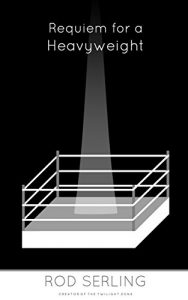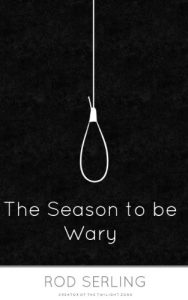While Serling's Kraft Theater teleplay, 'Patterns,' skyrocketed him amongst the elite writers of the Golden Age of Television, his Playhouse 90 script, 'Requiem for a Heavyweight,' cemented his position. This edition, for the first time ever, includes the original teleplay script and an insightful introduction by Mark Olshaker.
Once again, Jack Gould of the New York Times raved, "Requiem for a Heavyweight by Rod Serling, presented last night on Playhouse 90, was a play of overwhelming force and tenderness. It was an artistic triumph that featured a performance of indescribable poignancy by Jack Palance in the part of the inarticulate has-been of the prize ring.
Mr. Serling wrote a searing, inspired indictment of the worst side of the prize-fight game, the greedy mortals who live off the flesh and blood of helpless youths who want to be champions. His play depicted the utter brutality and inhumanity of a so-called sport that can leave men in the wreckage of their own punch-drunk double talk.
The essential figure of Requiem for a Heavyweight was a fighter who fought once too often and was told by a physician that he could not continue. But his avaricious manager, having taken the boy's health, now covets his spirit; he wants to use him as a clown in a wrestling match.
Only a compassionate second arranges for the towering man to take a train home to Tennessee; the fighter then has visions of making some use of his life after all. But on the train he shows a little boy how to box, and in the process he starts refighting his own past matches."
The climax may have been a little obscure. It could have been interpreted that in helping the youth the fighter had found himself. Or that for some pugilists, there never is an escape from the ring. Either way, Mr. Serling's play had immense power and poetry, and is certain to win many a prize.
Mr. Palance contributed a brilliant interpretation of the fighter. He projected the man's incoherence and bewilderment with a superb regard for details. To the huge and scar-ridden boxer he imparted a glowing and tragic humanness.
Ed Wynn, in his debut in a straight drama, was very good as the second who put a man's pride before the purse. His son, Keenan Wynn, playing the ruthless manager, was not quite so successful; he seemed neither smooth nor mean enough to be entirely convincing. Maxie Rosenbloom had several very good scenes as the reigning monarch of the babbling hangers-on in a saloon patronized by former fighters.
Mr. Serling and Mr. Palance contributed a notable evening of theater last night on Channel 2."
Serling, who took up boxing during basic training, won seventeen fights as a flyweight but was knocked out in the third round of his eighteenth fight by a pro, ending his boxing career. Praised for having "the ring in his blood," Serling says,"In truth I had left a helluva a lot of my blood in several rings."
Once again, Jack Gould of the New York Times raved, "Requiem for a Heavyweight by Rod Serling, presented last night on Playhouse 90, was a play of overwhelming force and tenderness. It was an artistic triumph that featured a performance of indescribable poignancy by Jack Palance in the part of the inarticulate has-been of the prize ring.
Mr. Serling wrote a searing, inspired indictment of the worst side of the prize-fight game, the greedy mortals who live off the flesh and blood of helpless youths who want to be champions. His play depicted the utter brutality and inhumanity of a so-called sport that can leave men in the wreckage of their own punch-drunk double talk.
The essential figure of Requiem for a Heavyweight was a fighter who fought once too often and was told by a physician that he could not continue. But his avaricious manager, having taken the boy's health, now covets his spirit; he wants to use him as a clown in a wrestling match.
Only a compassionate second arranges for the towering man to take a train home to Tennessee; the fighter then has visions of making some use of his life after all. But on the train he shows a little boy how to box, and in the process he starts refighting his own past matches."
The climax may have been a little obscure. It could have been interpreted that in helping the youth the fighter had found himself. Or that for some pugilists, there never is an escape from the ring. Either way, Mr. Serling's play had immense power and poetry, and is certain to win many a prize.
Mr. Palance contributed a brilliant interpretation of the fighter. He projected the man's incoherence and bewilderment with a superb regard for details. To the huge and scar-ridden boxer he imparted a glowing and tragic humanness.
Ed Wynn, in his debut in a straight drama, was very good as the second who put a man's pride before the purse. His son, Keenan Wynn, playing the ruthless manager, was not quite so successful; he seemed neither smooth nor mean enough to be entirely convincing. Maxie Rosenbloom had several very good scenes as the reigning monarch of the babbling hangers-on in a saloon patronized by former fighters.
Mr. Serling and Mr. Palance contributed a notable evening of theater last night on Channel 2."
Serling, who took up boxing during basic training, won seventeen fights as a flyweight but was knocked out in the third round of his eighteenth fight by a pro, ending his boxing career. Praised for having "the ring in his blood," Serling says,"In truth I had left a helluva a lot of my blood in several rings."












